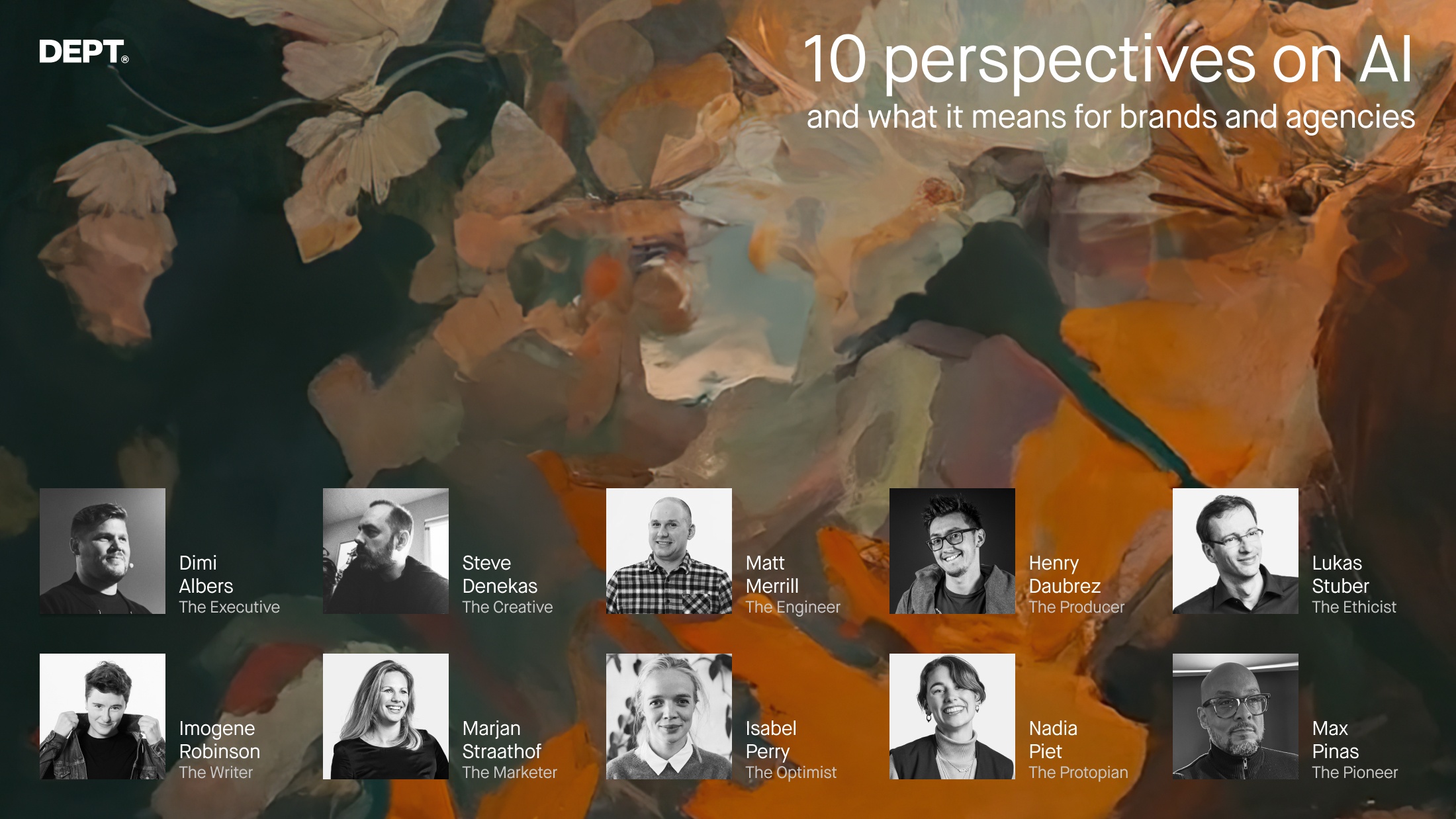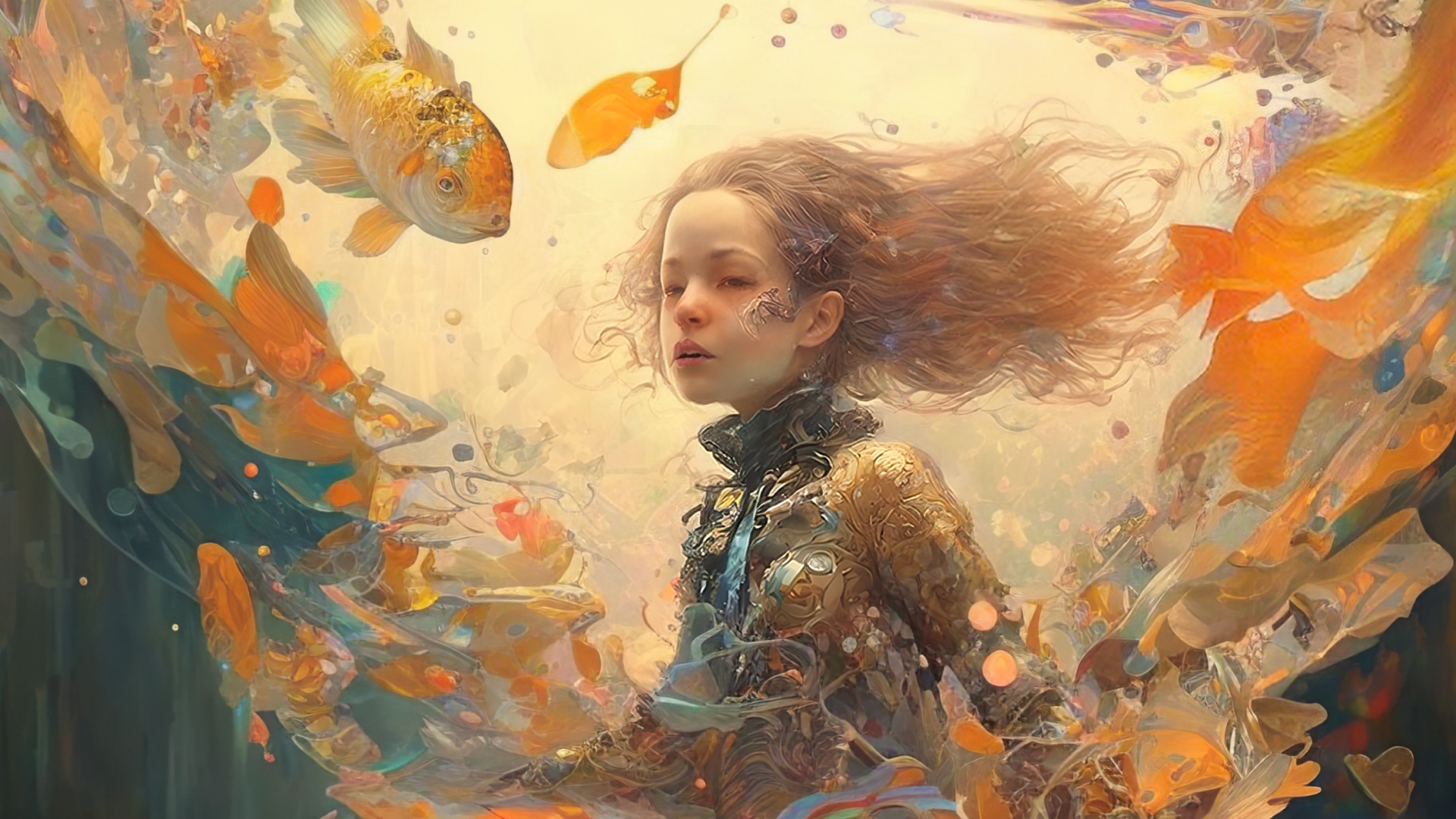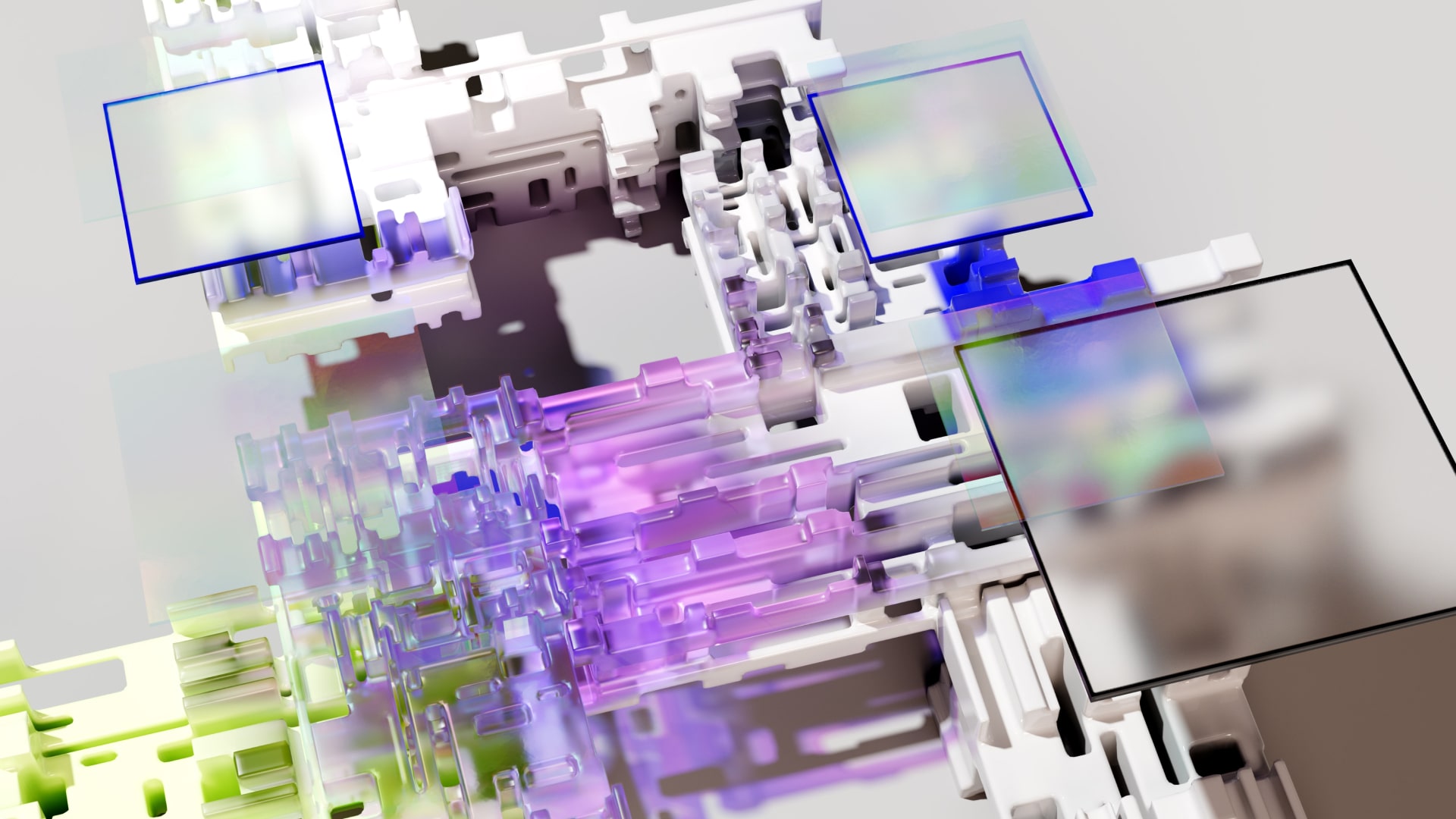AI has exploded
From DALL-E to ChatGPT, you’ve surely heard a lot about its potential—and the uncertainty around it.
AI’s effect on digital is nuanced. There are some amazing benefits of AI, but also potentially divisive aspects.
With 4,000 digital professionals within DEPT®, we don’t necessarily have one united point of view on a topic this massive and groundbreaking. Rather, there are differing attitudes depending on specialism.
Chances are the same discussions and debates are happening at your company.
Given the way that AI stands to impact different fields in different ways, we gathered a range of perspectives to offer an illustration of the possibilities for what’s to come in operations, marketing, engineering, design, and more.


The Executive, Dimi Albers
AI is a tool that stands to accelerate probably 80% of what we do by helping folks do their work better and faster. Although some movers and shakers will make intense use of AI right away, other folks will likely be more hesitant. That wariness is understandable: it’s a hard truth (but not unrealistic) to think that in the next 12-24 months AI could partially or fully replace some roles.
That said, regardless of how powerful this new tech is (or will be), now is the time to get a headstart in implementing AI, both with what we’re already doing and how it fits into complex systems within design, architecture, security, etc. Custom AI applications and integrations are a huge opportunity for clients, so we’ll be experimenting with AI development right away.
We fully anticipate AI to grow fast and become an integral part of production within the next decade. Getting in now will help clients to stay ahead of the competition.

The Creative, Steve Denekas
AI has the potential to enhance and augment the creative process, rather than replace it. Although it’s more intelligent than ever, AI isn’t going to take over the world. That’s all just Hollywood glamorization.
Eyebrow-raisers on LinkedIn are concerned with the ethics of AI, especially when it comes to authenticity and originality. What happens to these as creatives start to use AI as a tool more and more?
Nothing generated by AI is original. Then again, to quote Jim Jarmusch, “True originality is already nonexistent.” An inherent part of the creative process is piggybacking your idea on a pre-existing one. Similarly, creatives can use AI as a starting point and, from there, add their own authentic twist to better reflect brand values and aesthetics at a time when that’s more important than ever.
Right now, creative AI is impressive. But it’s only as good as the real-life creative using it.

The Engineer, Matt Merrill
I think we’re at the peak of inflated expectations with AI: throwing it at every problem, pouring money into anything with “AI” slapped on it, and generally behaving like overexcited puppies with a chew toy.
Putting too much faith in AI algorithms is risky, especially considering their known biases and relative infancy. Over the last ten years, we’ve seen virtual echo chambers created because of AI algorithms driven by massive amounts of behavioural data. Taken together with AI’s fundamental lack of human authenticity and emotion, I have some concerns about where we’re heading.
Don’t get me wrong, from a technological perspective AI is a pretty amazing accomplishment. It has huge potential for people simply because it isn’t a person. Major players like Microsoft are making big investments in tools like ChatGPT and DALL-E for their own engineering workflows.
But, realistically, I see tools like these assisting us with our work—not doing it for us. AI offers a useful new data source that comes pre-indexed, thanks to the way it’s presented. It could also help engineers dig ourselves out of blockers, like an especially tricky bug fix, with coding suggestions that we could amend. Similarly, engineers could use AI to add another layer of quality assurance by identifying potential issues in near-finished projects.
But my wish, even as a software engineer, is that the pendulum swings back to human-curated content and human-controlled services—with AI serving rather than replacing.

The Producer, Henry Daubrez
As a storyteller, for me, AI is a powerful tool for reimagining what you think you already know. You’re using your own words to enter input and then you see how it’s going to be reinterpreted.
In this way, I like how AI offers me surprises – which are a valuable part of my process. With storytelling, whether that be film, writing, or a series of images, you tend to begin with a rough idea of how the narrative will end up. As you’re working towards the final product, maybe an actor offers a new take on a character. Maybe an animator draws something differently. Whatever the case, it’s the surprises you encounter along the way in creating a story that helps bring it together.
Many traditional artists have concerns that, in opening new doors, AI will shutter old ones. But a lot of the best AI work I’ve seen is from people who value the old as much as they embrace the new.
AI is an exciting tool that is almost certainly going to be added to every creative’s toolbox in the near future. But to make full use of it, AI will still require the help of a ten-fingered hand.


The Ethicist, Lukas Stuber
There is no doubt that tools like ChatGPT spectacularly show the potential of AI. But, while experimentation is great, on an ethical level exploiting applications like these on a large scale now would be a bit negligent.
The big problem with ChatGPT in particular is reliability. The output of the AI is based on a massive text corpus created by humans, which means it’s subject to human error. Ask ChatGPT which weighs more, a kilogram of steel or a kilogram of feathers, and it will tell you the feathers are heavier. While logic errors like these will soon be fixed, the learning model that ChatGPT was trained on remains subject to language-based “brilliance biases” or political biases. And, as if that weren’t enough, AI is also subject to hallucination, its own self-generated errors.
To gauge the reliability (or lack thereof) of a ChatGPT response, users need to be able to trace the tool’s path from input to output. Unfortunately, this is impossible. What the tool does with an input, what data it uses as the basis for its output, and what steps it takes in between, are completely unknown.
In an era where truth is more important than ever, it’s imperative that knowledge is generated reliably. Ethically, the widespread dissemination of unreliable AI tools poses major issues.

The Writer, Imogene Robinson
A piece of tech that writes how a person talks? It’s understandable why content writers might be a bit worried. But I don’t think that writers have to put down their pens (or their keyboards) just yet.
With ChatGPT in particular, I don’t think it will replace writers — I think it will just change how we write. Instead of spending large chunks of our days working on SEO-friendly headlines or compiling pages of generalised research, we can copyedit texts generated by ChatGPT and devote the extra time to more nuanced and creative work.
That kind of content, which reads as more deliberate and authentic, is what audiences gravitate towards.
Even when I ask ChatGPT to explain why it could replace writers, it tells me that it won’t. Machine-based language generation models, it says, lack the understanding, creativity, critical thinking, and empathy that human writers have.
AI will undoubtedly become a tool for writers. Those that don’t make use of it will ironically be the folks who risk getting left behind. But the best content marketing will still rely on the writing and instinct of real-life human beings.

The Marketer, Marjan Straathof
I love ChatGPT. I see it as a personal assistant, helping me with a variety of marketing tasks.
Today, a marketer’s to-do list has gotten unwieldy, with unique demands across channels, audiences, locations, and formats. By using ChatGPT, I essentially have an editor that can revise, localise, and inject marketing best practices into my content. It’s also helpful for conducting light marketing research and giving me new ideas when I’m stumped.
The main thing that makes this tool so powerful for marketers is the core machine learning aspect of it. As marketing professionals, we have experience and knowledge, but often we lack the data to declare something works over something else. I believe with ChatGPT, marketing can become more effective, reaching more folks while reducing wasted resources.
In December, I tested this theory with a simple LinkedIn post I created in ChatGPT, specifying “virality” in my input. It spun up content that I then used to create my most engaging post of all time. In the context of the millions of posts created every day on that network, this seems hardly coincidental.
ChatGPT may be still finding its footing but, for me, it’s my new best work friend.

The Optimist, Isabel Perry
Given the public concern that we’ve all seen expressed, it’s important to remember that—as exciting and transformative as AI stands to be—it’s not magic. As a piece of technology made by and for people, AI will change our lives but it won’t replace us. And that makes me optimistic.
One of the biggest concerns over AI I’ve observed is its bias. In AI’s current form, it is undeniably biassed and other people will have doubtlessly already voiced the issues this could create.
That said, as someone with a lot of experience building technology, my optimistic take is that it is much easier to engineer bias out of a machine than a person.
A real-life doctor, for example, might have prejudices that affect the healthcare decisions they make on behalf of patients. But an AI medical provider could be trained to restrict biased approaches and offer superior medical care in certain cases.
New, transformative technology has always been met with wariness. But the real-world utility of technology is hardly ever as scary as some might expect. In this way, AI has a valuable purpose that will change everything but, in a much more real sense, will change nothing of our experience.

The Protopian, Nadia Piet
More people need to be prototopians when it comes to AI. In other words, more people need to embrace the potential for technology to bring about a better future for humanity, while also being mindful of the potential challenges that come with it.
To find a balanced approach to using AI that recognizes both the potential benefits and risks, we need an ongoing dialogue and collaboration between developers, engineers, writers, designers, policymakers, and the public at large.
I think that digital agencies are best positioned stand to help foster this kind of collaboration because their reach already extends to all of these stakeholders. In some amount of time, generative creative AI will play a role in their functions.
Imagine a product designer being able to rapidly prototype using high-fidelity mockups rather than low. Or a copywriter starting with 100 catchy headlines instead of three. Imagine searching for a piece of music that “replicates the essence of a desert storm” and getting results that actually sound like the essence of a desert storm. It’s all about saving time while maximizing creativity and outputs.
Aligning in this way won’t eliminate the risks of adopting this new technology. But it will help us, as a collective society, navigate them in a way that mitigates their effects.

The Pioneer, Max Pinas
AI is more than just a game-changer, it’s a solution to a massive problem in today’s world.
Large global brands are facing a significant challenge: the proliferation of channels and devices through which customers can interact with them. This has made it increasingly difficult for these brands to provide a consistent, high-quality customer experience across all touchpoints.
I see tools like ChatGPT helping e-commerce brands cross-functionally. Using this technology, they improve the efficiency of customer service teams, get brand-new insight into customer behaviour, and provide the hyper-personalised experiences that modern-day customers are looking for.
Imagine a personal shopper integration that can help style a look and give stylist-worthy fashion advice. That’s what’s in store for e-commerce if leveraged correctly.
The AI revolution is upon us. It’s important for global brands to start implementing AI now in order to gain a competitive edge and drive growth & value. In some cases, leveraging AI now will be a matter of survival.
The future is bright and unpredictable
Anyone who purports to know exactly how AI will impact the world—whether that be to kill jobs, solve global poverty, or erase originality once and for all—will most likely be wrong.
Now isn’t the first time that emerging technology has placed us on the threshold of a global transformation. Andrew Ng, one of the world’s leading AI experts and a former founder of Google Brain, compared the emergence of AI to the emergence of electricity:
“Just as electricity transformed almost everything 100 years ago, today I actually have a hard time thinking of an industry that I don’t think AI will transform in the next several years.”
Back when people were still reluctant to add newfangled electrical lights to their homes, no one could have predicted the eventuality of smart devices or the internet. Today we can hardly imagine a world without smartphones—and a world without lightbulbs is almost inconceivable.
It’s impossible to say exactly what AI’s impact will be, the only certainty seems to be it will be as broad and all-encompassing as the horizon.
25+ ways to leverage ChatGPT (so far)



